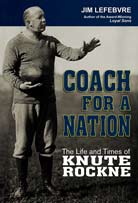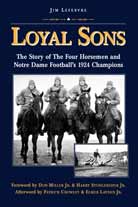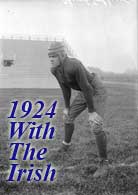By Jim Lefebvre, Editor, Forever Irish
The first week of August brings with it a special feeling – the start of the 2011 season is now less than a month away.
The Fighting Irish officially start pre-season camp on Saturday, star receiver Michael Floyd is back in the fold, and the team’s strong 2010 finish has earned at least some national respect, including a No. 18 ranking in the USA Today Coaches pre-season poll.
But another event this week takes us back 45 years – to the “The Game of The Century” between No. 1 Notre Dame and No. 2 Michigan State, at Spartan Stadium in East Lansing on November 19, 1966.
Bubba Smith died this week at age 66.
Bubba Smith, the Spartan strongman who chewed up and spit out offensive linemen for fun. Long before the Pro Bowls, the movie roles and the Miller Lite commercials, Bubba earned his legendary status with his on-field demeanor and destruction, and his off-field personality.
“Hubba, Hubba, here’s come Bubba,” was one campus battle cry surrounding the 6-foot-7, 285-pound Smith, a veritable giant in an era where a 230-pounder was a big man.
The frenzy surrounding the late-season matchup of the long-time rivals, both undefeated, was nearly unprecedented. A thunderous Thursday pep rally sent Coach Ara Parseghian and his players on to East Lansing, where national media attention was at a record level.
The scene, and the story, is marvelously told in the excellent book The Biggest Game of Them All, by Mike Celizic, the 1970 ND alum who went on to a superlative career as a sports writer, and died last fall of cancer at age 62.
Celizic recorded the recollection of Irish offensive tackle Bob Kuechenberg, who had the unenviable task of blocking Bubba.
“I kept hearing this ‘Kill, Bubba, kill,’ ” Kuechenberg told Celizic. “And being an English major, I knew that wasn’t a complete sentence because it lacked an object. Kill whom? Since I was the guy who was going to be blocking him, it must be me!.”
But Bubba didn’t kill Kuechenberg that day– though he did knock starting quarterback Terry Hanratty out of the game with a vicious hit early in the game. Of course, that set up the legendary performance of Coley O’Brien, the little-used backup who steadily guided the Irish that day to the memorable 10-10 tie that preserved for ND the No. 1 ranking, securing the school’s ninth consensus national championship.
Some fans may still argue about Coach Parseghian’s decision to hold on to the tie in the final minute rather than risk a costly turnover, but even many Spartans have come to the realization that it was the right decision.
The game itself marked a turning point in the history of college football – the launch of the era of games receiving massive national attention via the flickering box in people’s living rooms. Before then, most televised games were regional affairs,. Now, the big games would be played before the entire nation, generating a different level of attention.
“It was the end of one era and the beginning of another one,” Celizic once said. “I chose (the book’s) title not because it was the best game or the greatest game, but because of what it meant to college football.”
Remembering Pete Duranko
For this year’s Notre Dame-Michigan State game Sept. 17, members of the 1966 Irish will gather for a 45th reunion. There will be many stories told, some factual, others less so.
Their numbers decreased by one last month, though, with the passing of Pete Duranko, a key defensive cog as a senior defensive tackle in ’66. He earned the nickname “Diesel Duranko” as a fullback at Johnstown, Pa., Catholic High School. Duranko died after an 11-year battle with Lou Gehrig’s disease on July 8.
Duranko was part of a stellar defensive line for the ’66 Irish, with fellow tackle Kevin Hardy, and ends Alan Page and Tom Rhoads. They more than held their own against the powerful Spartans that day – playing virtually every defensive snap. There were no “defensive packages” or “personnel groups” in those days.
Duranko, who starred for the Denver Broncos, was remembered for his courage, humor and zest for life. For several years, he traveled the country, raising money and awareness in the larger fight against ALS. “I firmly think there will be a cure some day,” Duranko said.
R.I.P., Diesel.






